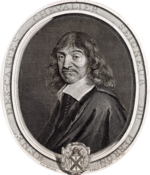Cartesianism
| Part of a series on |
| René Descartes |
|---|
 |
Cartesianism is the name given to the philosophical doctrine (or school) of René Descartes.
Overview of Cartesianism
Cartesians view the mind as being wholly separate from the corporeal body. Sensation and the perception of reality are thought to be the source of untruth and illusions, with the only reliable truths to be had in the existence of a metaphysical mind. Such a mind can perhaps interact with a physical body, but it does not exist in the body, nor even in the same physical plane as the body.
In general, Cartesian thought divides the world into three areas of existence:
- that inhabited by the physical body (matter),
- that inhabited by the mind, and
- that inhabited by God.
Geographical dispersal
In Holland, where Descartes had lived for a long time, Cartesianism was a doctrine popular mainly among university professors and lecturers. In Germany the influence of this doctrine was not relevant and followers of Cartesianism in the German-speaking border regions between these countries (e.g., the iatromathematician Yvo Gaukes from East Frisia) frequently chose to publish their works in Holland. In France, it was very popular, and gained influence also among Jansenists such as Antoine Arnauld, though there also, as in Italy, it became opposed by the church. In Italy, the doctrine failed to make inroads, probably since Descartes' works were placed on the Index in 1663.[1]
In England, due to religious and other reasons Cartesianism was not widely accepted.[1] Though Henry More was initially attracted to the doctrine, his own changing attitudes toward Descartes mirrored those of the country: "quick acceptance, serious examination with accumulating ambivalence, final rejection."[2]
Notable Cartesianists
- Antoine Arnauld[1]
- Balthasar Bekker[1]
- Johannes Clauberg[1]
- Michelangelo Fardella[1]
- Antoine Le Grand[1]
- Adriaan Hereboord[1]
- Pierre-Sylvain Régis[1]
- Henricus Regius[1]
- Jacques Rohault[1]
- Christopher Wittich[1]
- Edmond Pourchot
See also
References
- ^ a b c d e f g h i j k l Copleston, Frederick Charles (2003). A history of philosophy, Volume 4. Continuum International. p. 174. ISBN 978-0-8264-6898-7.
- ^ Lennon, Thomas M. (1982). Problems of Cartesianism. McGill-Queen's Press. p. 4. ISBN 978-0-7735-1000-5.
{{cite book}}: Unknown parameter|coauthors=ignored (|author=suggested) (help)
Bibliography
- Francisque Bouillier, Histoire de la philosophie cartésienne (2 volumes) Paris: Durand 1854 (reprint: BiblioBazaar 2010).
- Eduard Jan Dijksterhuis, Descartes et le cartésianisme hollandais. Études et documents Paris: PUF 1951.
- Tad M. Schmaltz (ed.), Receptions of Descartes. Cartesianism and Anti-Cartesianism in Early Modern Europe New Yoork: Routledge 2005.
- Richard A. Watson, The Downfall of Cartesianism 1673-1712. A Study of Epistemological Issues in Late 17th Century Cartesianism The Hague: Martinus Nijhoff 1966.
